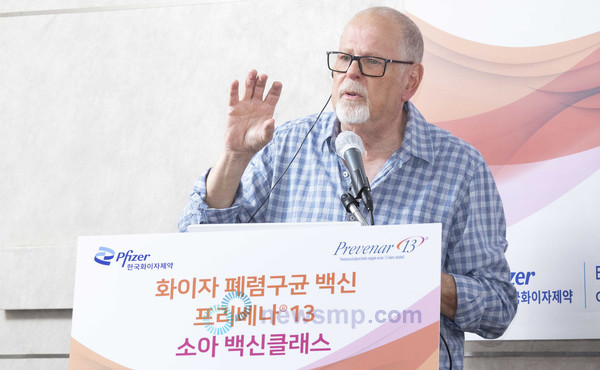[Newsmp]
Vaccines that cause problems vs vaccines that solve problems.
While opinions are divided over the impact of 10-valent and 13-valent pneumococcal conjugate vaccines (PCVs) on serotype 19A pneumococcal disease, a session was held to highlight the value of the 13-valent PCV based on domestic and foreign epidemiological data.
Pfizer Korea (CEO Oh Dong-wook) hosted a session on Prevnar 13, a pneumococcal conjugate vaccine, on Oct. 28, at Lotte Hotel in Seoul.

At this session, Ron Dagan, professor of pediatrics and infectious diseases at the Ben-Gurion University of the Negev in Beer-Sheva, Israel, delivered the burden of the serotype 19A among pneumococcal diseases.
Pneumococcus causes pneumonia or acute otitis media, and depending on the site of invasion, it can generate serious diseases such as sepsis, bacteremia and pleurisy.
In particular, it is important to block transmission through the elderly and children who are vulnerable to infection, since pneumococcus is likely to be present in the nasal cavity of children under the age of five.
In the past, it was difficult to prevent them due to poor effects in children when only polysaccharide vaccines existed, but after the PCV was developed, immunogenicity was maintained in children and showed preventive effects.
However, early PCVs were able to prevent only seven of the more than 100 different serotypes of pneumococci.
This brought the burden of diseases caused by the remaining serotypes that cannot be prevented by the 7-valent vaccine increased, and serotype 19A has merged as an important health issue since it causes a fatal disease and has strong resistance to antibiotics.
“As some serotypes susceptible to antibiotics are decreasing and some serotypes are decreasing due to prophylactic vaccines, the proportion of other serotypes is increasing significantly," said Dagan. “Among these, serotype 19A is not only the most common remaining serotype at this time but also the most resistant to antibiotics and the serotype that causes the most serious problems.”
Accordingly, after the 7-valent vaccine, the 13-valent conjugate vaccine (Prevnar 13), which directly included the serotype 19A, and the 10-valent conjugate vaccine, which emphasized the cross-protection effect against 19A through serotype 19F, appeared and replaced the existing vaccines.
Nevertheless, the controversy over serotype 19A continued. The debate over the cross protection of the 10-valent vaccine was constant.
In countries that introduced the 13-valent vaccine, including the serotype 19A, the burden of disease caused by the serotype 19A was steadily reduced, while in countries that introduced the 10-valent vaccine did not include the 19A, the burden from the 19A continued to increase.
Professor Dagan shared Taiwan’s case as an example. The pressure of diseases caused by the serotype 19A, which had been increasing since the introduction of the 7-valent PCV, has soared even after the adoption of the 10-valent vaccine.
However, he explained that the disease burden of the serotype 19A, which had been increasing uncontrollably, plummeted after switching to the 13-valence vaccine.
“In the case of Taiwan, a 10-valent vaccine was made available in the private market, but the serotype 19A became a huge monster,” he said. “As a result of the introduction of a 13-valent vaccine, including the serotype 19A, the burden of disease caused by 19A was reduced.”
According to Professor Dagan, in Belgium and New Zealand, the disease caused by the serotype 19A, which was greatly reduced due to the introduction of the 13-valent vaccine, is rapidly increasing again after switching to the 10-valent vaccine.
In Belgium, the proportion of the serotype 19A in Streptococcus pneumoniae has decreased to 5% in three years since the introduction of the 13-valent vaccine in 2011 but has recently increased to 50% after switching to the 10-valent vaccine.
“I hoped that the serotype 19F of the 10-valent vaccine would have cross protection on 19A, but now I have given up hope. 19F alone does not sufficiently prevent 19A,” Dagan stressed.
For that reason, he emphasized that the 10-valent vaccine did not have a significant impact on the carrying rate of the serotype 19A and that 19A should be prevented directly to catch 19A.
Dagan explained that the 10-valent vaccine is a vaccine that causes problems due to the serotype 19A, and the 13-valent vaccine is a vaccine that prevents it.
Currently, Korea includes pneumococcal vaccines in the National Immunization for children and has made a somewhat unique choice.
Despite the controversy, Korea included both vaccines in the national mandatory vaccination project. It is known that 13-valent vaccines account for about 80% to 90% of the vaccination rate.
“I have visited Korea several times and advised the Korea Disease Control and Prevention Agency at the time of the national immunization program,” Dagan said. “At that time, if the two vaccines were introduced, 85% to 90% of the 13-valent will be fine, and fortunately, it is encouraging that the doctors seem to be making the right choice.”
For that reason, he added, “About 85% of the 13-valent vaccine is herd immunity, and even children vaccinated with the 10-valent vaccine can expect a prevention effect against the serotype 19A.”


